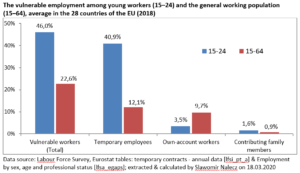Since the beginning of March 2020 an outbreak of COVID-19 has changed people’s life, at least temporarily, in most of the EU countries. While the older Europeans found their health and life directly endangered by the coronavirus, the millions of young ones cannot make their livings due to the necessary epidemic lockdown of places where they used to work more often than the other age-groups e.g. restaurants, hotels, shops, delivery, entertainment and tourism businesses.
What is more, the period of economic instability will last for at least a couple of months. In the circumstances of economic slowdown (if not recession) the companies typically try to cut costs. This means there will be natural striving to economize on the labour bills. The easiest way in such circumstances is to reduce spendings on temporary employment contracts as well as on the bills for the jobs which have been previously outsourced.
Therefore, the first victims of the crisis on the labour market will be temporary employees and own-account workers, including the entrepreneurs’ family members who used to support the one-person enterprises without any paid contract.
The recent data show that 22% of working persons across the EU are employed based on precarious forms, which are likely to be the most affected by the coronavirus crisis . Among the youngest group of workers i.e. aged 15–24 the rate of belonging to one of the vulnerable groups is twice as high and reaches 46%.

Written by Fundacja Rozwoju Demokracji Lokalnej







